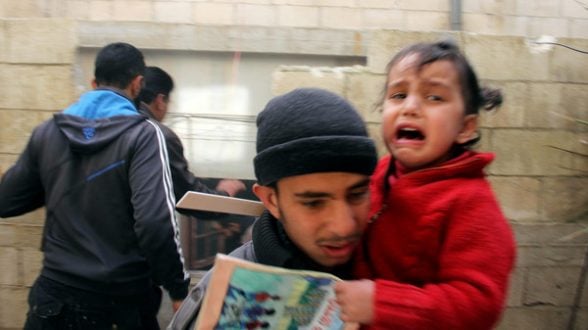Assad’s forces continue to use banned barrel bombs: report
y Peter Harrison | Al Arabiya News
Wednesday, 25 February 2015
Wednesday, 25 February 2015
Syrian forces continue to carry out hundreds of air strikes using barrel bombs, killing and wounding thousands of people, according to a report published Tuesday by Human Rights Watch (HRW) – claims previously denied by President Bashar al-Assad.
Yet despite the findings, Nadim Houry, deputy Middle East and North Africa director of HRW, said nothing was being done to tackle the issue, despite United Nations Security Council Resolution 2139 of Feb. 22, 2014, which demanded all parties in the Syrian conflict “end the indiscriminate use of barrel bombs and other weapons in populated areas.”
“For a year, the Security Council has done nothing to stop Bashar al-Assad’s murderous air bombing campaign on rebel-held areas, which has terrorized, killed, and displaced civilians,” Houry said.
“Amid talk of a possible temporary cessation of strikes on Aleppo [northern Syria], the question is whether Russia and China will finally allow the U.N. Security Council to impose sanctions to stop barrel bombs,” he added.
The report claims that schools, hospitals and mosques have all been hit in air strikes where barrel bombs have been used.
Barrel bombs are unguided and non-specific in their targeting – otherwise known as “area bombardment,” which is prohibited under international humanitarian law.
Recent attack claims
Rami Abdulrahman, founder and director of the London-based Syrian Observatory for Human Rights (SOHR), told Al Arabiya News that 2,432 barrel bombs were dropped in the four months leading up to Jan. 20, 2015, with at least 10 used over Deraa and northern Syria on Tuesday.
No figures were given of the possible number of deaths or wounded caused by Tuesday’s alleged attacks.
But according to a report released by the Observatory earlier this week, it can document more than 30,000 civilians having been killed or wounded in barrel bomb attacks from aircraft between Feb. 22, 2014 and Feb. 21, 2015.
Of those figures, the Observatory said 5,812 of those killed were civilians, including 1,733 children and 969 women.
In an interview with the BBC on Feb. 10, 2015, Assad dismissed claims that government forces were still using barrel bombs.
But HRW says it has “identified at least 450 distinct major damage sites in 10 towns and villages held by rebel groups in Deraa and over 1,000 in Aleppo between Feb. 22, 2014, and Jan. 25, 2015.”
The statement adds: “These impact sites have damage signatures strongly consistent with the detonation of large, air-dropped munitions, including improvised barrel and conventional bombs dropped by helicopters.”
HRW said the imagery also appeared to show damage which possibly resulted from the use of rockets, missiles, or fuel-air bombs.
HRW spoke to a number of doctors that treated mainly women and children wounded in the attacks. One doctor said that most of the victims “were being injured by fragments of explosive weapons.”
Doctors who have spoken to HRW have also said that government forces appear to have also targeted known medical facilities.
And according to a 50-year-old humanitarian worker referred to as Samih, barrel bombs have even hit schools.
The man told HRW that on March 26 he saw the aftermath of an attack in Dael. He told HRW that his niece and nephew both lost their legs in an attack which left at least a dozen children wounded or dead.
Both HRW and the Observatory say that non-state armed groups have also conducted indiscriminate attacks, including car bombs and explosive weapons in government-held areas.
The HRW statement said “the Security Council should impose an arms embargo on the government as well as rebel groups implicated in widespread or systematic indiscriminate attacks, Human Rights Watch said.”
The Observatory says it has documented the death of 1,102 civilians, including 234 children and 133 women, due to mortar and tank shells, rockets, explosive propane gas cylinders and shells of Jahannam Cannon launched by Syrian Al-Qaeda affiliate the Nusra Front, Jund al-Aqsa Organization, rebel and Islamic battalions on several areas in the Syria provinces.
The U.N. Security Council is due to meet on Feb. 26 for the next round of reporting on resolution 2139.
http://english.alarabiya.net/en/perspective/analysis/2015/02/25/Assad-s-forces-continue-to-use-banned-barrel-bombs-report.html

